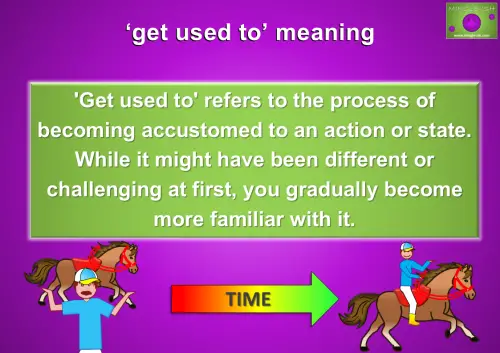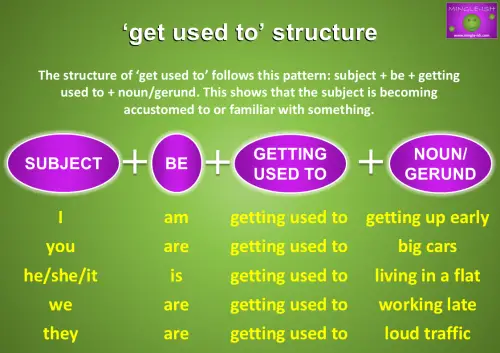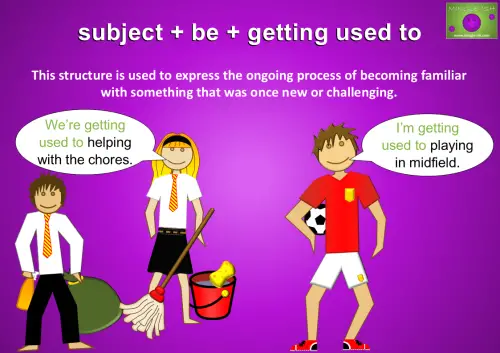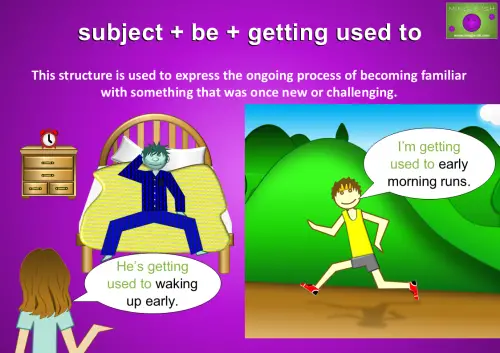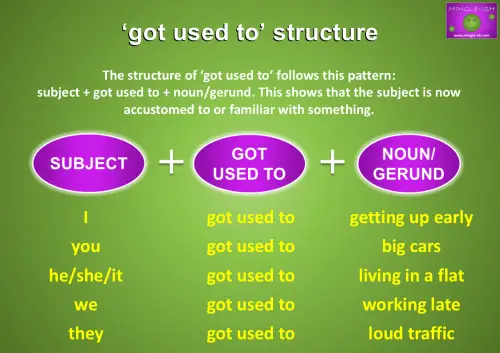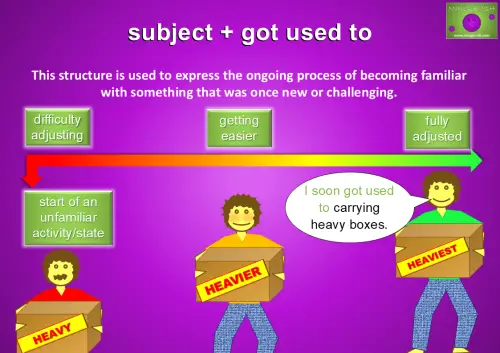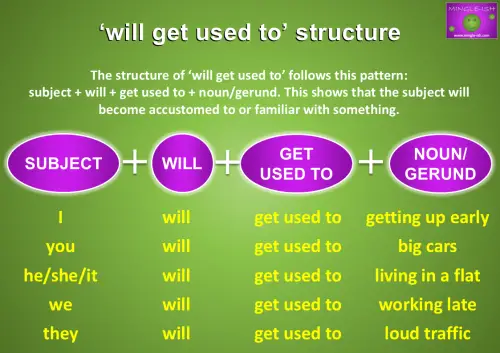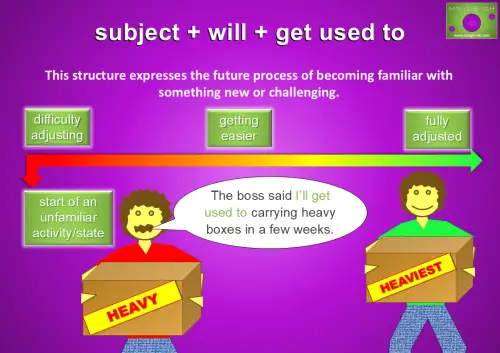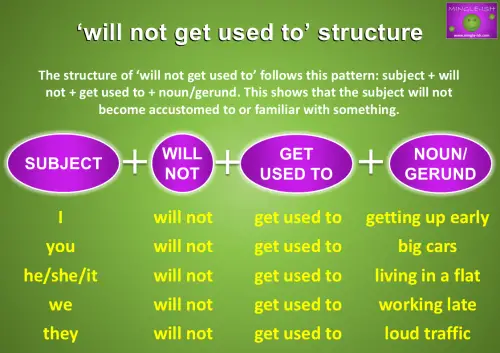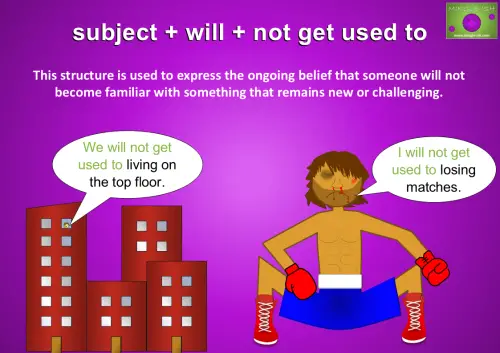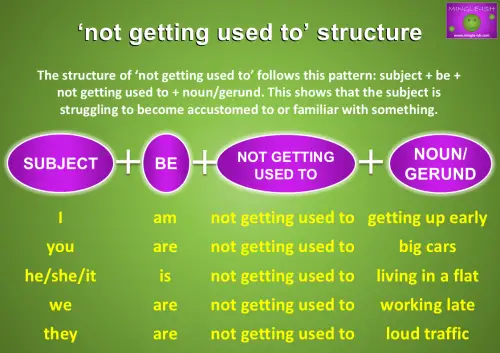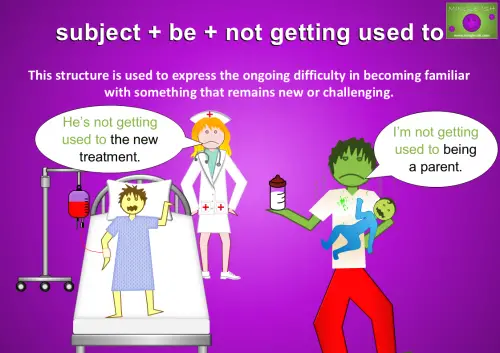Contents
Understanding how to use ‘get used to’ is essential for expressing the process of adapting to new situations in English. Whether you’re talking about adjusting to a new job, lifestyle, or habit, ‘get used to’ helps you explain the gradual change that takes place over time. In this guide, we’ll break down how to correctly use ‘get used to’ in sentences, with clear examples to help you master this important grammar structure. Ready to get familiar with ‘get used to’?
Let’s dive in!
‘Get used to’ meaning
‘Get used to’ refers to the process of becoming accustomed to an action or state. While it might have been different or challenging at first, you gradually become more familiar with it. For instance, I am getting used to eating spicy food. The cuisine in England tends to be quite mild, so initially, it was a shock to my taste buds. However, now they are adapting to the new flavours.
‘Get used to’ structure
The structure of “get used to” involves using the verb “get” to indicate a transition, followed by “used to” which shows becoming accustomed to something. After “used to,” the phrase is completed with either a noun or a gerund (a verb ending in -ing). This structure highlights the process of adjustment, meaning that the action or situation was once unfamiliar or difficult, but over time the subject becomes more comfortable with it.
examples
Here are some example sentences that illustrate how to use the ‘get used to’ structure in different contexts:
- After moving to a new city, it took me a while to get used to the busy public transport system.
- I’m slowly getting used to waking up early for my new job.
- At first, the loud noise from the construction outside was distracting, but I’m starting to get used to it.
- She had to get used to her new role at work, but she’s now more confident in her abilities.
- He’s getting used to living without his smartphone and enjoying the break from constant notifications.
- It was tough to get used to the cold weather after living in a warmer climate for so long.
past tense – got used to
When using “get used to” in the past tense, you’re talking about the process of becoming accustomed to something that happened in the past. This could refer to actions, situations, or routines that were once unfamiliar or challenging but gradually became more comfortable over time. The structure typically follows the pattern: subject + got used to + noun/gerund.
Take a look at the picture below, which illustrates the timeline of becoming accustomed to something. It starts with “not used to,” moves through the process of “getting used to,” and ends with “got used to,” showing the progression from unfamiliarity to comfort. This visual will help you better understand how we describe becoming familiar with new habits or situations over time.
future tense – will get used to
When using “will get used to” in the future tense, you’re talking about the process of becoming accustomed to something that will happen in the future. This refers to actions, situations, or routines that are currently unfamiliar or challenging but will gradually become more comfortable over time. The structure typically follows the pattern: subject + will get used to + noun/gerund.
Take a look at the graphic below, which shows the process of becoming familiar with something in the future. It highlights the progression from “not used to” through the stage of “will get used to,” emphasising the time it takes to adapt. This visual representation helps you understand how we talk about adjusting to new routines, situations, or challenges that lie ahead, showing the future process of becoming comfortable with them.
negation
not get used to
When using “not get used to,” you’re talking about the process of struggling to become familiar or comfortable with something. This refers to actions, situations, or routines that remain unfamiliar or challenging over time, and the speaker doesn’t anticipate adjusting to them. The structure typically follows the pattern: subject + will not get used to + noun/gerund, emphasising that the subject will likely continue to find the experience difficult or uncomfortable in the future.
Here are some examples of “will not get used to” in sentences:
- I will not get used to waking up this early every day.
- She will not get used to the noise in the city.
- They will not get used to the new office location.
- He will not get used to driving on the left side of the road.
- We will not get used to working such long hours.
not getting used to
When using “not getting used to,” you’re referring to an ongoing process where someone is struggling to adjust to something. This could be an action, situation, or routine that remains challenging or uncomfortable, and the person is still in the phase of trying to adapt, but hasn’t reached full comfort. The structure typically follows the pattern: subject + be + not getting used to + noun/gerund, showing that the adjustment process is incomplete or difficult.
Here are some examples of “not getting used to” in sentences:
- I’m not getting used to waking up early every day.
- She’s not getting used to her new job responsibilities.
- They aren’t getting used to living in a busy city.
- He’s not getting used to the cold weather.
- We’re not getting used to the new schedule at work.
In conclusion, knowing how to use “get used to” helps you talk about adjusting to new things in different tenses. Whether you’re still adapting with “getting used to,” struggling with “not getting used to,” or talking about the future with “will get used to,” these phrases let you explain how familiar or comfortable something becomes over time.
